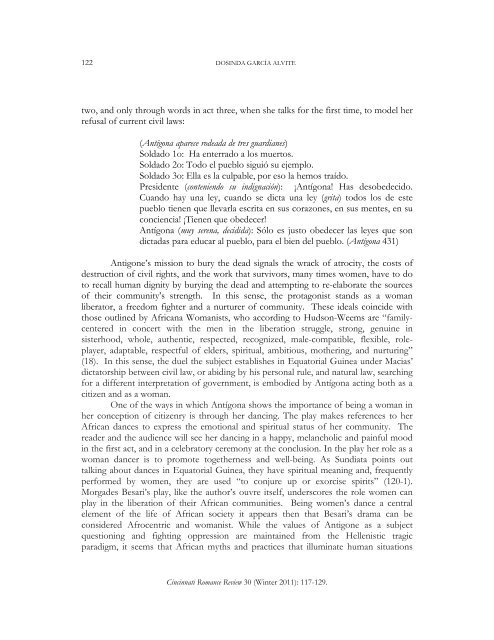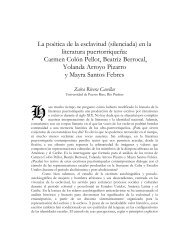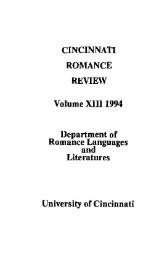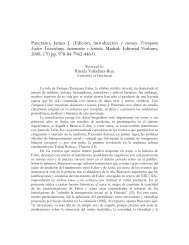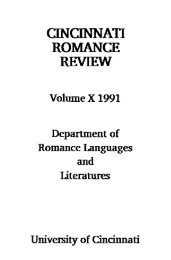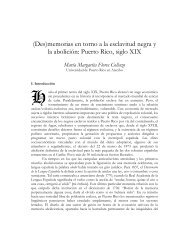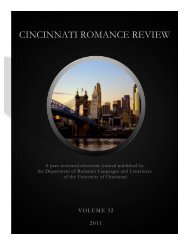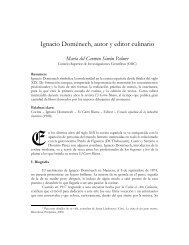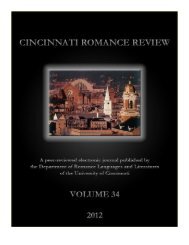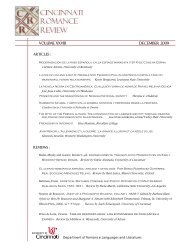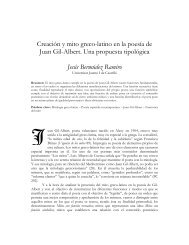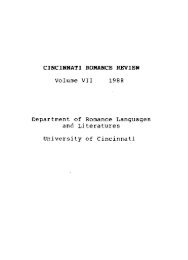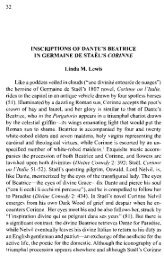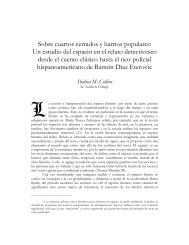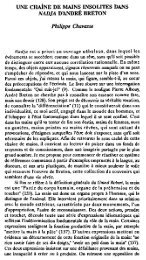Volume 30 (2011) - Cincinnati Romance Review
Volume 30 (2011) - Cincinnati Romance Review
Volume 30 (2011) - Cincinnati Romance Review
Create successful ePaper yourself
Turn your PDF publications into a flip-book with our unique Google optimized e-Paper software.
122 DOSINDA GARCÍA ALVITE<br />
two, and only through words in act three, when she talks for the first time, to model her<br />
refusal of current civil laws:<br />
(Antígona aparece rodeada de tres guardianes)<br />
Soldado 1o: Ha enterrado a los muertos.<br />
Soldado 2o: Todo el pueblo siguió su ejemplo.<br />
Soldado 3o: Ella es la culpable, por eso la hemos traído.<br />
Presidente (conteniendo su indignación): ¡Antígona! Has desobedecido.<br />
Cuando hay una ley, cuando se dicta una ley (grita) todos los de este<br />
pueblo tienen que llevarla escrita en sus corazones, en sus mentes, en su<br />
conciencia! ¡Tienen que obedecer!<br />
Antígona (muy serena, decidida): Sólo es justo obedecer las leyes que son<br />
dictadas para educar al pueblo, para el bien del pueblo. (Antígona 431)<br />
Antigone’s mission to bury the dead signals the wrack of atrocity, the costs of<br />
destruction of civil rights, and the work that survivors, many times women, have to do<br />
to recall human dignity by burying the dead and attempting to re-elaborate the sources<br />
of their community’s strength. In this sense, the protagonist stands as a woman<br />
liberator, a freedom fighter and a nurturer of community. These ideals coincide with<br />
those outlined by Africana Womanists, who according to Hudson-Weems are “familycentered<br />
in concert with the men in the liberation struggle, strong, genuine in<br />
sisterhood, whole, authentic, respected, recognized, male-compatible, flexible, roleplayer,<br />
adaptable, respectful of elders, spiritual, ambitious, mothering, and nurturing”<br />
(18). In this sense, the duel the subject establishes in Equatorial Guinea under Macias’<br />
dictatorship between civil law, or abiding by his personal rule, and natural law, searching<br />
for a different interpretation of government, is embodied by Antígona acting both as a<br />
citizen and as a woman.<br />
One of the ways in which Antígona shows the importance of being a woman in<br />
her conception of citizenry is through her dancing. The play makes references to her<br />
African dances to express the emotional and spiritual status of her community. The<br />
reader and the audience will see her dancing in a happy, melancholic and painful mood<br />
in the first act, and in a celebratory ceremony at the conclusion. In the play her role as a<br />
woman dancer is to promote togetherness and well-being. As Sundiata points out<br />
talking about dances in Equatorial Guinea, they have spiritual meaning and, frequently<br />
performed by women, they are used “to conjure up or exorcise spirits” (120-1).<br />
Morgades Besari’s play, like the author’s ouvre itself, underscores the role women can<br />
play in the liberation of their African communities. Being women’s dance a central<br />
element of the life of African society it appears then that Besari’s drama can be<br />
considered Afrocentric and womanist. While the values of Antigone as a subject<br />
questioning and fighting oppression are maintained from the Hellenistic tragic<br />
paradigm, it seems that African myths and practices that illuminate human situations<br />
<strong>Cincinnati</strong> <strong>Romance</strong> <strong>Review</strong> <strong>30</strong> (Winter <strong>2011</strong>): 117-129.


